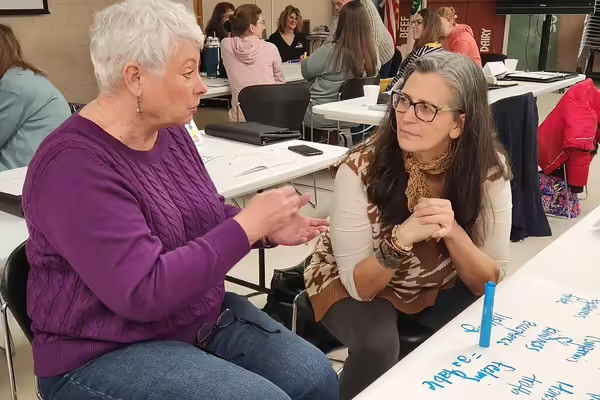
PEKIN, Ill. - The landscape of American agriculture is evolving, and at its heart is a growing wave of women stepping into leadership roles on the farm. According to the latest U.S. Ag Census, nearly 36% of the nation’s producers are now female, marking a significant shift in who is shaping the future of our food systems. University of Illinois Extension and Tazewell County Farm Bureau are working to empower these women through Annie’s Project.
Annie’s Project is a national nonprofit organization dedicated to strengthening women’s roles in agriculture through educational programs. Their signature program Annie’s Project 101 provides 18 hours of training in five key areas of agricultural risk: production, human, financial, market, and legal.
This year’s program, co-hosted by Tazewell County Farm Bureau, was delivered in a new, hybrid format that combined 2 days of in-person sessions with six hours of online content. This allowed participants to learn some of the content at home, on their own schedule while the in-person sessions focused on group discussion and activities.
“This new hybrid format made Annie’s Project more accessible for farm women with full schedules,” said Tara Heath, Illinois Extension commercial ag educator and Annie’s Project facilitator. “We had more younger participants this year who might not have been able to commit to the traditional multi-week format. So much of this program’s results from exchanging ideas and building a network. A more diverse group enriched that experience.”
Twenty women from seven different Illinois counties attended the program held at the Tazewell County Farm Bureau on February 27-28. Local Extension educators presented on a variety of topics including estate planning, leasing, record keeping, farm stress, nutrient loss, and the Real Colors personality assessment. COUNTRY Financial Senior Crop Underwriting Trainer Brenda Dozier explained the basics of crop insurance and Senior Market Advisor Cathy Eckstrand with Total Farm Marketing presented on commodity marketing.
“We were thrilled to bring back Annie’s Project to Tazewell County and be part of such an impactful program that helps empower women working in all facets of agriculture,” said Emily Rogier, Tazewell County Farm Bureau Manager. “It was such a rewarding experience seeing how confident participants left feeling like they gained essential decision-making tools and a clearer understanding of how to make informed decisions for each of their farming operations.“
The program has been offered in Fulton, Mason, Peoria, and Tazewell counties, in partnership with the local Farm Bureaus since 2016. Locally, more than 100 women have completed the course in this time. Nation-wide, Annie’s Project courses have successfully reached more than 9,000 farm and ranch women in 33 states.
PHOTO CAPTION
Annie’s Project 101 has been offered locally since 2016 in partnership with Farm Bureau. This year a hybrid format was utilized to make it more accessible to a more diverse audience: 2-day, in person sessions along with six hours of online content. Twenty women from seven counties attended.
University of Illinois Extension develops educational programs, extends knowledge, and builds partnerships to support people, communities, and their environments as part of the state's land-grant institution. Extension serves as the leading public outreach effort for University of Illinois Urbana-Champaign and the College of Agricultural, Consumer and Environmental Sciences in all 102 Illinois counties through a network of 27 multi-county units and over 700 staff statewide. Extension’s mission is responsive to eight strategic priorities — community, economy, environment, food and agriculture, health, partnerships, technology and discovery, and workforce excellence — that are served through six program areas — 4-H youth development, agriculture and agribusiness, community and economic development, family and consumer science, integrated health disparities, and natural resources, environment, and energy.